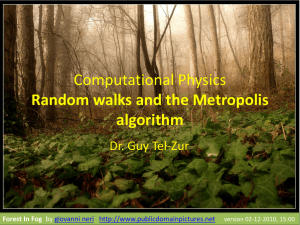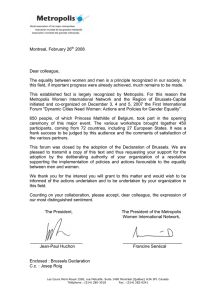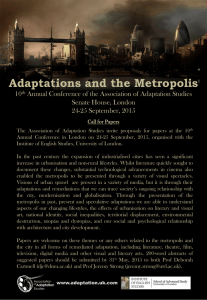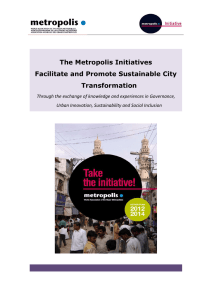Yes 2009/2011 Action Plan World association of the major metropolises
advertisement
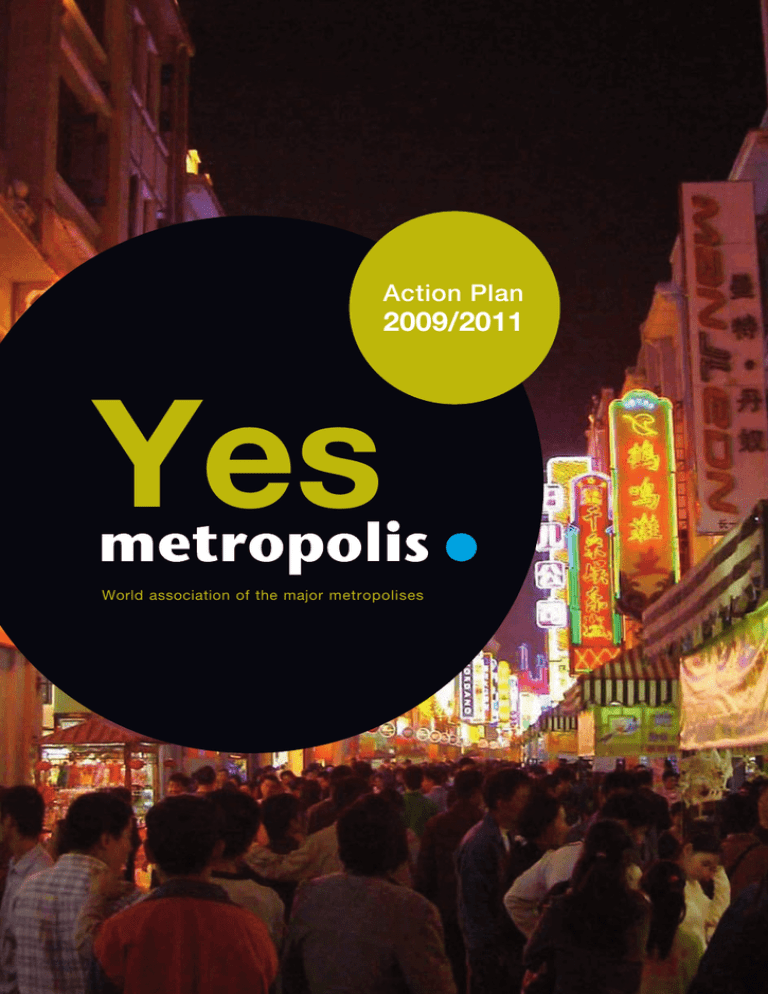
Action Plan 2009/2011 Yes World association of the major metropolises Board of Directors President Paris-Île-de-France, Jean-Paul Huchon Président du Conseil Régional d’Île-de-France First Executive Vicepresident Europe Barcelona, Jordi Hereu, Alcalde de Barcelona Presidente del Área Metropolitana de Barcelona Executive Vicepresident Asia Pacific Melbourne, Justin Madden, Minister for Planning/State of Victoria Executive Vicepresident and Treasurer North America Montréal, Gérald Tremblay, Maire de Montréal Executive Vicepresident Africa Abidjan, Djédji Amondji Pierre, Gouverneur du District d’Abidjan Executive Vicepresident Latin America & Caribbean São Paulo, Alberto Goldman, Gobernador de São Paulo Regional Vicepresident Europe Berlin, Ingeborg Junge-Reyer Senator for Urban Development Regional Vicepresident Asia Pacific Seoul, Oh Se-Hoon Mayor of Seoul Regional Vicepresident North America México, Enrique Peña Nieto Gobernador del Estado de México Regional Vicepresident Africa Antananarivo, Edgard Razafindravahy President de la Delegation Speciale (PDS) Regional Vicepresident Latin America & Caribbean La Habana, Juan Contino Aslán Presidente de la Asamblea Popular Europe, Istanbul Kadir Topbas Mayor of Metropolitan Istanbul Europe, Moscow, Youri M. Loujkov Mayor of Moscow Europe, Bruxelles Jean-Luc Vanraes Ministre des Relations extérieures de la Région de Bruxelles Europe, Stockholm Sten Nordin Mayor of Stockholm Asia Pacific, Guangzhou Zhang Guangning Mayor of Guangzhou Municipal People’s Government Africa, Le Caire Ahmed El Maghraby Minister of Housing Utilities and Urban Development North America, Toronto David Miller Mayor of Toronto Africa, Bamako Adama Sangaré Maire du Gouvernorat du District de Bamako Africa, Rabat Omar El Bahraoui, Président du Conseil Municipal de Rabat Hassan Barcelona Josep Roig Secretary General Abidjan Émile Danho Regional Secretary Africa Montreal Amara Ouerghi Regional Secretary North America São Paulo Stela Goldenstein Regional Secretary South America Melbourne Yehudi Blacher Regional Secretary Asia-Pacific Paris-Île-de-France Philippe Kaltenbach Regional Secretary Europe Mission Metropolis wishes to build a global alliance between metropolitan governments and their associates to promote urban sustainability: Metropolis wishes to accompany the actions of its members in six priority areas: • Fostering a cross-sectorial approach and inter-relations between the different aspects of urban sustainability: environmental, economic, social and cultural. • In mutual learning, as a result of the transfer of knowledge, practices and experiences between metropolitan governments and their associates. • Acting both in already urbanized metropolitan regions and ones in a phase of strong urban growth. • Defining public-private action and cooperation projects between institutions and levels of government. • Working to reduce the sustainability gap and to promote innovation and metropolitan governance. “ The mission of Metropolis is to accompany cities in mutual learning, innovation, governance, technical/financial assistance, international presence and debate. ” • In innovation, understood as a result of collaboration between city governments and groundbreaking businesses and entities in the management of urban issues. • In metropolitan governance, understood as collaboration between metropolitan governments on the one hand and the other levels of local, regional and state governments on the other; public/private cooperation and public participation. • In technical/financial assistance, to mobilize new financial resources for investments earmarked at sustainable and efficient development. • In presence in international forums and the defense of city interests and concerns. • In the debate about ideas on city trends and evolution. Objectives Metropolis will consider the following for the current period: 01. Promoting mutual learning, training and preparation. 02. Speeding up innovation to find solutions to city problems. 03. Contributing toward metropolitan governance to reduce metropolitan imbalances. 04. Promoting financial and technical assistance to metropolitan areas in developing countries. 05. Representing and giving political visibility to metropolitan interests before national and international institutions. 06. Promoting a reflection on trends in the evolution of cities and metropolitan policies. Activities Some of the activities to be developed include: STANDING COMMISSIONS TRAINING · Eco-Regions and Food Security. The training activities anticipated in the plan will be carried out, and subsidiary offices of the Montreal Training Institute were created in Mashhad, Seoul, Cairo and Moscow. · Managing Urban Growth. · Integrated Urban Governance. · Megacities. · Partnership for Urban Innovation. · Global Fund for Cities Development. · International Women’s Network. INTERNATIONAL ACTIVITIES Metropolis will represent city interests before international organizations (especially UN organizations via ECOSOC and UNHabitat, UNACLA, Cities Alliance, the World Bank, the US Conference of Mayors, ICLEI and others) and it will take part in international activities and meetings in collaboration with UCLG. Metropolis Member Cities Montreal Toronto Atlanta Monterrey La Habana Guadalajara México Ecatepec Puebla Maracaibo Caracas Bogota Quito Brasilia La Paz Belo Horizonte Guarulhos Rio de Janeiro São Paulo Córdoba Santiago Porto Alegre Buenos Aires Moscow Stockholm Kazan Manchester Bruxelles Paris Rabat Harbin Zagreb Bucarest Sarajevo Madrid Lisboa Omsk Berlin Barcelona Alger Tunis Casablanca Istambul Diyarbakir Tabriz Sofia Beyrouth Athenes Tel Aviv Amman Alexandria Marrakech Cairo Mashhad Tehran Esfahan Ahvaz Shiraz Dubai Nouakchott Bamako Niamey Jilin Shenyang Beijing Almaty Dalian Incheon Tianjin Seoul Daejeon Gyeonggi Zhengzhou Gwangju Daegu Ulsan Chengdu Shanghai Busan Kathmandu Wuhan Hangzhou Changsha Taipei Chongqing Kolkata Taichung Nanning Guangzhou Hanoi Bangalore Dakar Accra Cotonou Abidjan Bangui Addis Ababa Colombo Douala Libreville Yaoundé Bangkok Manila Kuala Lumpur Kampala Surabaya Brazzaville Dili Kinshasa Jakarta Harare Port Moresby Antananarivo Johannesburg Gauteng Sydney Melbourne Commission 1 PRESIDENCY Île-de-France Region (Paris) Eco-Regions VICE-PRESIDENCIES Brazzaville, Caracas and Moscow The objectives of the Commission are the following: Over this period, the Commission anticipates: To present case studies on food security, open space management (semi-urban agriculture and biodiversity) and global warming. Organizing a food security workshop in collaboration with the United Nations Food and Agriculture Organization (FAO). To exchange experiences with the cities which take part in Commission meetings. Disseminate information and organize training for local authority managers and the people of an African country, in collaboration with the International Training Institute in Montreal. To gather the suggestions and expectations of Commission members and organize training sessions. Organize seminars targeted at the heads of local authorities. Develop a reflection to create the conditions needed for cooperation exchanges with cities that require technical support. Organize a work meeting on global warming. Commission 2 Managing Urban Growth The purpose of this Commission is to explore the issues of rapid urbanisations and liveability of cities: what makes cities liveable to their inhabitants and attractive to investors; and what governments are doing or should do to protect, promote and enhance the liveability of cities. The areas that the project will investigate are: Essential infrastructure: an assessment of the challenges and complexities of providing the essential infrastructure needed to cope with urban growth, including an assessment of the relative merits of upgrading existing infrastructure versus building new infrastructure. Inequities and social exclusion/inclusion: the Commission will investigate the effects of various approaches to building economic and social opportunities for the least well-off, and will assess how full participation in social, economic and civic life by all improves the wellbeing and the liveability of cities overall. Competitiveness and positioning in the global economy: the Commission will examine how planning, design and implementation of sustainable urban concepts contribute not only to the liveability of cities, but also to their global competitiveness. The role of governments and governance: urbanisation, rapid development of technology and a globalised economy are redefining the role of governments. These are looking for private sector partners (public/private partnerships) in providing essential services to their communities. The Commission will address this issue through the experiences of the participants, with the view to identify preferred PPP models. PRESIDENCY Melbourne VICE-PRESIDENCY Cairo Commission 3 PRESIDENCY Berlin VICE-PRESIDENCIES Porto Alegre and State of Mexico Integrated Urban Governance This Commission aims to offer good practices and recommendations on integrated urban governance that can help breach the social and spatial fragmentation that exists in big cities. In schools in disadvantaged neighborhoods, integrated urban governance can shore up the image of the school and carry out groundbreaking projects with new methods and educational content. Above all, it involves achieving better integration of economic agents and those from civil society, at both the political level and that of the public administration, in decision-making and planning processes of municipal governments to make them true ‘co-producers’ and ‘coparticipants’ in the making of decisions on urban development. Support for the local economy via integrated urban governance consists, among other things, of supporting local businesses, creating independent activities, contributing to the creation of networks, freeing up access to microcredits, facilitating access among local people to jobs and ‘formalizing’ the informal economy. Three issues are particularly essential to obtaining integrated urban governance: education, the local economy and mobility. Integrated urban governance actions permit cities to offer disadvantaged groups (economically and geographically) accessible and efficient means of transport, as well as managing overall mobility centered on participation. Commission 4 Megacities Commission 4 aims to discover the groundbreaking initiatives currently being promoted in metropolitan areas of more than 10 million inhabitants, defined as Megacities. Major urban agglomerations are sometimes seen as spaces for disorganization, traffic jams, violence, poverty, environmental decline and atmospheric pollution - in other words, urban chaos. However, the taskforce wishes to share the real experiences of Megacities and demonstrate that these cities are not only a source of problems and challenges but also of opportunities, particularly in the context of the globalized world. It furthermore proposes investigating ways of remedying some of the principal challenges for the proper management of this emerging phenomenon, via exchanges and cooperation PRESIDENCY Mexico DF between counterpart cities that can share not just the problems, but also the solutions. Finally, the Commission aims to work together with universities, research institutions and international organizations that study and discuss the problems of major urban agglomerations. In short, Metropolis proposes a meeting space for those Megacities that share a particular problem because of their size and the complexity of their government and management. Commission 5 PRESIDENCY Barcelona VICE-PRESIDENCY Karnataka Government (Bengalore) Partnership for Urban Innovation The commission aims to foster innovation in cities and local governments in close partnership with the private sector and other interested institutions. Metropolis wants to set up an active group of worldwide experts to think and advise about how innovation can help local and metropolitan governments to reach a next stage in the development of cities and citizens’ life. Metropolis has given the commission a clear mandate: 1. Help governments and their external partners or stakeholders in improving the way innovation is lead, managed and implemented in cities. 2. Help the Metropolis network of cities and stakeholders in scaling up and replicating innovations in cities. The Partnership for Urban Innovation (PUI) program will organize regular events to review and demonstrate advances, identify typical problems of the innovation process, and document lessons and conclusions about the innovation process. A second and central feature of the organizational arrangements of the PUI is a core cluster of innovation centers, each associated with a city and one or more private sector firms and institutional stakeholders that will anchor implementation actions in different policy areas. The Secretariat will also coordinate with Montreal Training Institute to facilitate development of training events and materials that emerge from the PUI and which can be integrated into Metropolis’s program of training and technical assistance. Commission 6 Global Fund for Cities Development Metropolis and UCLG call on local authorities and their national, regional and international associations, bilateral and multilateral cooperation agencies and the World Bank to take part in the creation of a worldwide fund for city development. The fund will be an instrument of technical and financial engineering assistance that will provide cities with access to local and international financing, complementing the devices linked to international financial institutions that currently exist. Metropolis calls on international financial institutions to use this opportunity to consolidate financing targeted at poor countries to promote both the formulation and the application of more dynamic urban economic and social infrastructure policies and programs, raising the possibilities of southern cities to access financing. Metropolis and UCLG are currently looking to develop an appropriate financial instrument to tackle the present situation which permits better understanding of the risks inherent to projects, improves the mobilization of internal resources and cuts the cost of urban development for local organizations. This instrument will provide the knowhow and experience needed for the cities that so require them, while also enabling the realization of diversified processes of decentralized cooperation and facilitating access to international investors. PRESIDENCY Île-de-France Region (Paris) Commission 7 PRESIDENCY Montreal Metropolis International Women’s Network The Metropolis International Women’s Network, headquartered in Montreal, is an international space for exchanges and cooperation between women who occupy a political, executive or professional position in local and metropolitan areas. Its main goals are: to improve women’s representation in local governments and in decisionmaking processes within local and metropolitan authorities, and to facilitate the dissemination of experiences and good practices related with good governance. The Network currently has regional sections based in: Abidjan, Amman, Athens, Bamako, Bangui, Barcelona, Brussels, Dakar, Estado de México, Mashhad, Pune and Seoul. The Network has set the following goals for the current period: To develop and support the regional sections. To start up an International Women’s Network webpage. To organize iinternational forums for women. To participate in international organizations and events related with similar themes. To organize training activities in collaboration with the Metropolis International Training Institute and other international organizations. To collaborate with international organizations dedicated to similar or complementary issues (UNHabitat, UCLG, etc.) To seek financing from international and national organizations and private foundations to carry out Network activities. Training Metropolis International Training Institute The Institute’s mission is to enable cities (institutions and individuals) to acquire and apply global and local knowledge to their development challenges by delivering learning programs and sharing activities from formal training to deeper technical assistance. The Institute helps cities, their leaders and managers to build and improve their leadership and technical skills as well as their decision-making approaches. For the current period, the Institute will have the following strategic orientations: Helping member cities apply knowledge for development challenges. Developing a client-centered approach to better respond to cities’ needs and have a higher impact on change and competitiveness. Developing new face-to-face training programs. Developing a field study program for city-to-city learning. Using appropriate new technologies for distance learning. Moving towards decentralization in order to deliver tailored regional programs. Developing and working in partnerships with cities, universities, international organizations and private sector. To better respond to cities’ needs, the Institute will also develop regional branches in Mashhad (Iran) for cities in the Middle East, and in Seoul (South Korea) for Asian cities. HEADQUARTERS Montreal Abidjan Accra Addis Ababa Alexandria Alger Almaty Amman Antananarivo Athènes Atlanta Bamako Bangalore Bangkok Bangui Barcelona Beijing Belo Horizonte Berlin Beyrouth Bogotá Brasilia Brazzaville Bruxelles Bucarest Buenos Aires Busan Cairo Caracas Casablanca Changsha Chengdu Chongqing Colombo Córdoba Cotonou Daegu Daejeon Dakar Dalian Diyarbakir Dili Douala Dubai Ecatepec Gauteng Guadalajara Guangzhou Guarulhos Gwangju Gyeonggi Hangzhou Hanoi Harare Harbin Incheon Istanbul Jakarta Jilin Johannesburg Kampala Kathmandu Kazan Kinshasa Kolkata Kuala Lumpur La Habana La Paz Libreville Lisboa Madrid Manchester Manila Maracaibo Marrakech Mashhad Melbourne México México D.F. Monterrey Montréal Moscou Nanning Niamey Omsk Ile-de-france Port Moresby Porto Alegre Puebla Quito Rabat Rio de Janeiro Santiago São Paulo Sarajevo Seoul Shanghai Shenyang Shiraz Sofia Stockholm Surabaya Sydney Tabriz Taichung Taipei Tehran Tel Aviv Tianjin Toronto Tunis Ulsan Wuhan Yaoundé Zagreb Zhengzhou Secretariat General of Metropolis Avinyó, 15 08002 Barcelona (Spain) tel. +34 93 342 94 60 Fax +34 93 342 94 66 metropolis@metropolis.org www.metropolis.org
